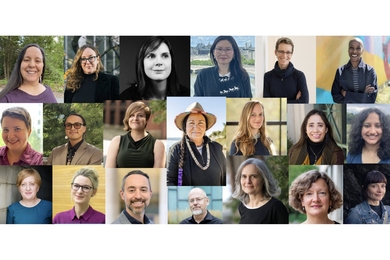Last week, the MIT AgeLab participated in a two-day summit in Portland, Maine, dedicated to fighting social isolation among older adults in rural communities. The 2018 Connectivity Summit on Rural Aging, with more than 130 national leaders in attendance, was hosted by Tivity Health in partnership with the MIT AgeLab, Health eVillages, and the Jefferson College of Population Health.
Social isolation carries a greater health risk than obesity or smoking, according to some metrics, and is associated with increased mortality, mobility loss, functional decline, and clinical dementia. Attendees at the summit worked to find actionable ideas to reduce the impact of social isolation and enable better health for those aging in rural areas.
Leaders at the Summit included Donato Tramuto, Tivity Health CEO and Health eVillages founder; Congressman Joe Kennedy III (D-MA); Cara James, co-chair of the CMS Rural Health Council; Robin Lipson of the Executive Office of Elder Affairs for the Commonwealth of Massachusetts; and Joseph Coughlin, founder of the MIT AgeLab and author of The Longevity Economy: Unlocking the World’s Fastest-Growing, Most Misunderstood Market.
A co-organizer of the summit, the MIT AgeLab conducts research on business and policy innovations in the longevity economy and on opportunities to improve quality of life for older adults and those who care for them. The AgeLab also organizes and supports outreach and community groups for older adults and professionals in the field of aging.
Underpinning the importance of the Connectivity Summit on Rural Aging are the results of a new national poll, commissioned by Tivity Health and released on Aug. 7. The poll shows that nearly one-third (29 percent) of rural older adults do not experience daily social interaction, and many are dealing with physical impairments such as vision loss (39 percent), hearing loss (36 percent), and loss of mobility (23 percent). A majority (66 percent) of older adults in rural areas say they want public officials in their states and the business community (67 percent) to do more to address their needs.
“The segments of the older adult population in rural areas that are dealing with social isolation represent a largely unseen and unheard America,” says Coughlin. “Their struggles are more pronounced, and yet they are also harder to reach. The good news is this is also an extraordinarily resilient population, and we have a tremendous opportunity to work together to bring services and solutions to their doorstep that will reverse this trend.”
“A hallmark of Tivity Health’s mission is to promote solutions that improve the quality of life for seniors. That’s why we’re focused on opportunities to improve the health and well-being of older Americans who experience the impacts of social isolation,” says Donato Tramuto, CEO of Tivity Health and founder of Health eVillages. “My vision when launching this summit two years ago was to ensure that actions, not just words, would empower stakeholders to work together to reverse the effects of social isolation. I am pleased that less than two years later we have successfully created a movement that has mobilized actions to support older Americans by addressing the impacts of social isolation.”










